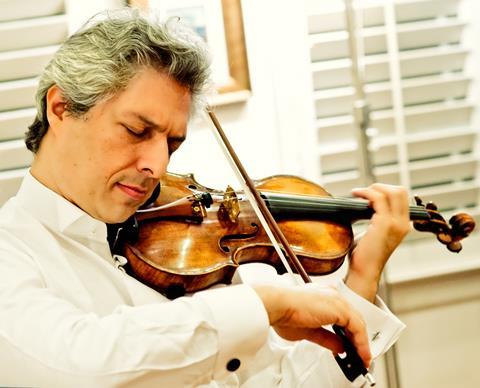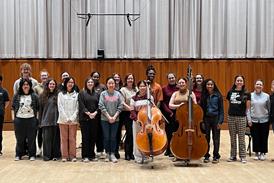Gary Levinson, senior principal associate concertmaster of the Dallas Symphony Orchestra, sets out the principles of successful audition preparation

Summer is festival season and a time I look forward to, primarily because I get to see old and new friends as well as students who have, at one time or another, studied with me. I also get to work with new students who often come up with wonderful ideas which inspire me to rethink things which I previously thought of as the Holy Grail. Questions this summer were especially geared to technique, an area I really enjoy discussing.
Taking one example that seems to have stubbornly come up in the past three months, I have fielded questions on spiccato. How do we control it and still keep it lithe, they ask? Well, before we go there, what spiccato are we talking about? The penetrating stroke found in the last movement of the Tchaikovsky Concerto, or the effervescent spiccato of the Mendelssohn Octet Scherzo? I like to go from big concepts to small, so I tend to show them a ‘bread and butter’ basic stroke, then go to specifics.
Thus in writing about the preparation for an orchestra audition in the US, let’s discuss the main pillars that will drive a successful audition. In order of importance, they are: requisite starting time to prepare; stylistic knowledge of the music; and strategy to get your best playing under pressure.
How much time is enough to prepare?
Isn’t it different for each individual? At first glance absolutely. But I would argue before you jump to an arbitrary calendar date (three weeks prior to audition seems to be the general time of choice this summer), define what you need to do to be ready. The minimum in my opinion is:
- Learning the music with style, dynamic contrast and conviction
- Hearing the entire work, even if you’ve played it before, performed by a world-class artist. First video found on YouTube is a bad idea unless you know who it is. YouTube advertising drives searches towards the top (as they should, given the service advertising is supposed to deliver), but doesn’t help a conservatory student trying to learn first page of Don Juan from a less than reputable source.
- Taking enough lessons with your teacher, provided they work on excerpts, or another coach who would be able to work through all of the works on your list. The weakest link theory is alive and well at auditions, plus the candidate subconsciously knows what is not totally prepared and tends to play differently, something the committee will pick up on immediately.
- Playing though at least half of your list daily. I know exactly how long it takes, I have done it. This is why conservatory students have a time advantage over people in the professional ranks; simply put, a full time job won’t allow four-hour run-throughs daily. More on that later.
Taking the above information cumulatively, I would say a more realistic timetable is about three months. I always recommend that candidates dedicate the summer to prepare for auditions, when one is generally less busy with events that are inflexible. There is a great precedent from the brilliant Salvatore Accardo, who once told me that he devotes the summer to learning and relearning repertoire as there is simply not enough time during the course of the year to do so properly.
Stylistic knowledge
Moving on to style, it’s important to do ten minutes of research on the composer and the work you are asked to play. Just playing it to the tempo and dynamics on the page is not enough! Late Mahler crescendos and Korngold crescendos are a world apart even though they are both Viennese. Using my prior spiccato example, playing the Midsummer Night’s Dream Scherzo with the stroke of Prokofiev’s Classical Symphony will not win you points with the committee.
Under pressure
Finally, the deep subject of how to play your best. 10,000 hours of practice? Beta blockers? Hope for a lucky day? My advice is leave as little as possible to chance. This means:
- Play parts of your audition for others you respect
- Don’t listen to your friends just because they are your friends; listen to people who are proven successful at what you are trying to achieve. If they happen to be your friends, all the more power to you!
- Record your playing all the time with video. Much of what you may be struggling with can be hard to nail down when listening to yourself, but seeing you on video can be a wake-up call and you can fix it immediately. Nobody likes to see themselves in HD (can you believe how awful that jacket looks on me?), but if you see a solution which you fix in the privacy of your practice room, isn’t it better than working for three months only to not advance for some silly reason?
- Prepare your concerto as if you are ready to play all of it. The old European audition routine was two concerti and the committee decides. There is something to that. When you only practise the exposition of your concerto, and the music director asks for the recap, you could be embarrassed with residual effects negatively affecting the rest of your audition. Be ready to play what the audition materials say you are responsible for.
- Practise running some of your concerto and excerpts in uncomfortably hot and/or cold temperatures. While it’s everyone’s hope that the audition venue is room temperature, that doesn’t always happen. Humidity can wreak havoc on sound production and intonation, so it is good to at least take the mental shock out of the equation by trying it in the practice room.
There are many other ways to prepare for the audition, but, after you’ve done the hard work of preparing yourself for this battle (and I don’t use the term lightly), the most important thing to remember is to share the music with the committee. Remember these people are there to decide who may be their colleague for the next 30 years. They would really like it to be someone who makes music with them in the most genuine manner possible.
Gary Levinson is on the faculty of Audition Perform, a five-day course geared towards audition preparation, held at the University of Chichester, UK from 5 to 11 August 2018. The course has been developed in conjunction with the European String Teachers Association, Musical Orbit, and The Strad and applications open on 1 October 2017. Register interest here.








































No comments yet